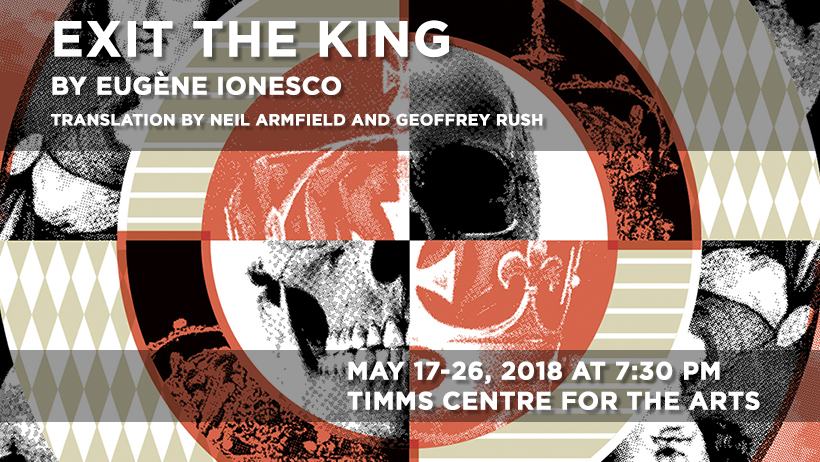
From Exit the King dramaturgical notes by Tonya Rae Chrystian
Written over a period of 20 days in 1962 between bouts of liver illness, Ionesco refers to Exit the King “as an attempt at an apprenticeship at dying,” as a way to creatively transpose his lingering fear of mortality.

Sir Alec Guinness as King Berenger I and Googie Withers as Queen Margherite (Exit the King, Royal Court Theatre, 1963)
The play first debuted in English in 1963 starring Alec Guinness in the title role at the Lyceum Theatre, but perhaps the most important English-language production is that which starred Geoffrey Rush as the burlesque, fool-hardy yet frightening, Berenger I. This 2009 Broadway production was a rave success, becoming a New York Times’ Critic’s Choice as theatre reviewer Ben Brantley writes “Mr. Rush is not only more entertaining than the usual never-say-die bogeyman but also more frightening. That’s not because you’re worried that the 400-year-old Berenger might come after you in your dreams, Freddy Krueger style; it’s because you know that the seedy, power-addled egomaniac onstage – who’s working overtime to dodge his own mortality – is, quite simply, you,” for clever indeed is the man who knows exactly what his life has meant.
Exit the King centres around Berenger I, a bouffon king who has lost all power over his crumbling kingdom; he cannot command his plucky maid any more than he can control the heavens. The march of destiny has come to claim his life but it’s all very to-do and a little unfair – after all, why are we born if it isn’t meant to be forever?
Over the course of the play, Berenger attempts the many tactics we humans turn to when faced with our own demise, including denial, anger, and bargaining, but also reverting to boyhood, commanding a paralyzed army, blaming your incompetent ministers, shouting at a deaf God, giving execution orders, and hiding under your throne.
All to no avail.
At the edge of death there is no time, space, meaning, or power. You must cross the boundary, you must succumb to the void, and you must do it alone. You are going to die and no revolution on earth, or in the cosmos, can save you.
But as bleak as all of this may sound, Ionesco graciously gives us cause to laugh at our shared human foibles and follies throughout.
The great French mime and theatre pedagogue, Jacques Lecoq, under whom our translator Geoffrey Rush studied and trained, said that to enter the Absurd is to call upon contradictory logic. Imagine you stop and ask for directions and are told your path lies to the right. You then thank the person kindly before immediately departing to the left. This is in essence the incongruity of Absurdism, the genre to which Exit the King belongs.
As per Martin Esslin, the scholar who first identified Theatre of the Absurd as a coherent movement, albeit one that was not self-proclaimed by its participants, “Theatre of the Absurd strives to express its sense of the senselessness of the human condition and the inadequacy of the rational approach by the open abandonment of rational devices and discursive thought.”
Esslin continues with his characterization of Absurdist plays by arguing that “if a good play must have a cleverly constructed story, these have no story or plot to speak of; if a good play is judged by subtlety of characterization and motivation, these are often without recognizable characters and present the audience with almost mechanical puppets; if a good play has to have a fully explained theme, which is neatly exposed and finally solved, these often have neither a beginning nor end; if a good play is to hold the mirror up to nature and portray the manners and mannerisms of the age in finely observed sketches, these seem often to be reflections of dreams and nightmares; if a good play relies on witty repartee and pointed dialogue, these often consist of incoherent babblings.”
For our playwright Ionesco, he understood the Absurd to be “that which is devoid of purpose […] Cut off from his religious, metaphysical, and transcendental roots, man is lost; all his actions become senseless, absurd, useless.”
Thus, we enter into the world of Exit the King and the mindscape of King Berenger I, where Ionesco for the first time in his lengthy and prolific career approaches this genre with near classical, formal control.
In case you missed it, read more about the playwright Eugène Ionesco in Inside Exit the King Part 1: Enter the Playwright.

EXIT THE KING
May 17-26, 2018
Timms Centre for the Arts
Tickets & Information
![]() Previous articleInside “Exit the King” Part 1: Enter the PlaywrightNext article
Previous articleInside “Exit the King” Part 1: Enter the PlaywrightNext article![]() A Message from “Exit the King” Director Kevin Sutley
A Message from “Exit the King” Director Kevin Sutley
